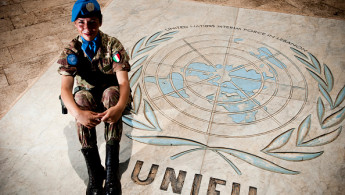UN mission in Lebanon needs different rules of engagement, Italy says
The 16 EU countries contributing to the U.N. peacekeeping mission in Lebanon believe its rules of engagement need to be more effective, the Italian defence ministry said on Wednesday.
Since an Israeli ground invasion began on 1 October, UNIFIL positions have come under fire and two Israeli tanks burst through the gates of one of its bases, the U.N. says. Five peacekeepers have been injured.
The countries, including Spain, Italy and France, contribute more than a third of some 10,000 troops to UNIFIL and the recent incidents have caused alarm among European governments.
Their defence ministers spoke by video call on Wednesday to assess the current situation, how to improve the force protection and to look at options for the force should a ceasefire materialise, including troop numbers, equipment and the mission's posture on the ground, diplomats said.
"It was also strongly expressed that the rules of engagement need to be revised to allow UNIFIL to operate more effectively and safely," an Italian defence ministry statement said, without going into detail.
It added that the 16 had shown a willingness to exert maximum political and diplomatic pressure on Israel so that no further incidents occur.
A French defence ministry readout gave no concrete conclusions to the meeting beyond repeating existing positions and saying all parties would not "tolerate that United Nations' soldiers are targeted or exploited in a conflict that must cease immediately".
Speaking to Reuters, Austrian Foreign Minister Alexander Schallenberg, whose country has about 160 troops in the ground, said one of the key challenges for UNIFIL was resupplying troops with food and equipment amid a worsening situation.
He also said dealing with troop rotations was also an issue.
"But I believe the fact that the UN, the international community has ears and eyes in the south of Lebanon continues to be indispensable," he said.
(Reuters)




 Follow the Middle East's top stories in English at The New Arab on Google News
Follow the Middle East's top stories in English at The New Arab on Google News

![A group of Palestinians, foreign and Israeli activists gather to participated in an olive picking event on the land in the town of Battir, which is under threat of confiscation by Israel in Bethlehem, occupied West Bank on 8 November 2024. [Getty]](/sites/default/files/styles/image_330x185/public/2182930803.jpeg?h=199d8c1f&itok=__0LgGsa)
